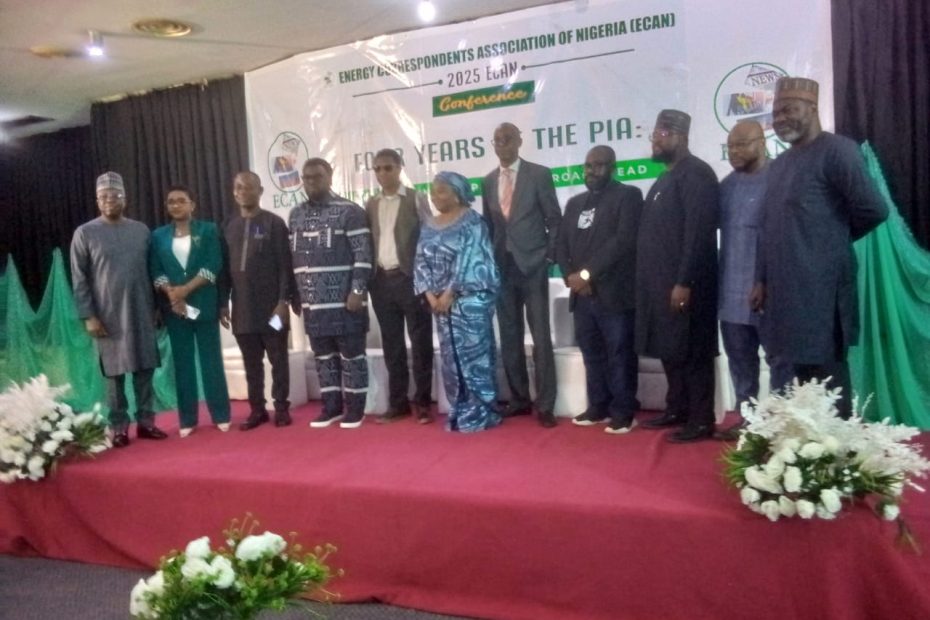…as operators call for improved operational efficiency
BY SAM OTUONYE
The Nigerian Upstream Petroleum Regulatory Commission (NUPRC), has reiterated its commitment towards increasing the country’s oil production to 2.5 millions barrels per day (mpd), leveraging the benefits of recent reforms in the sector.
Delivering a keynote speech at the maiden edition of the Annual Conference of the Energy Correspondents Association of Nigeria (ECAN), on Thursday at the Nicon Luxury Hotel, Abuja, Engr. Komolafe noted that Nigeria is actively ramping up crude oil production by reactivating dormant fields, fast-tracking regulatory approvals, and enhancing operational efficiencies across the upstream value chain.
“Through our Project One Million Barrels Initiative, launched in 2024, Nigeria is actively ramping up crude oil production by reactivating dormant fields, fast-tracking regulatory approvals, and enhancing operational efficiencies across the upstream value chain.
“With a clear target of increasing production to 2.5 million bpd by 2026, the initiative has already demonstrated strong momentum with current unreconciled daily production averaging 1.7 – 1.83 million bpd,” he said.
The conference with the theme, “Four Years of the Petroleum Industry Act (PIA): Achievements, Gaps and the Way Ahead,” the ECAN Conference brought together policymakers, and industry stakeholders to review the progress so far made since the enactment of the PIA over four years ago.
Komolafe, who was represented by the
Head of Regulatory and Statutory Compliance at the Commission, Mr Kingston Chikwendu, stated that the NUPRC in embracing its mandate with a clear focus on upstream resource optimisation has issued 19 enabling regulations that operationalize key provisions of the PIA.
These regulations, according to him, are benchmarked against global standards, providing a stable and predictable framework that enhances investor confidence.
He affirmed that the Commission’s recent bid rounds – anchored on quality data access, regulatory certainty, and an investor-centred reform agenda – recorded unprecedented successes.
These, he said include: the 57 PPL awards of 2022, the 2022 Mini-Bid Round, and the 2024 Licensing Round. Noting that each of these rounds was conducted with unprecedented transparency, unmatched competitiveness, and remarkable investor engagement.
Engr. Komolafe, also said that the approval of 37 new evacuation routes, coupled with intensified collaboration with national security agencies, has significantly curtailed crude theft and enhanced accountability across the industry.
“At the same time, the enforcement of the Domestic Crude Supply Obligation (DCSO) is securing consistent feedstock to local refineries, strengthening Nigeria’s internal supply chains and building long-term economic resilience,” he added.
However, Major Energies Marketers Association of Nigeria (MEMAN) has called on the government to ensure implementation of the Petroleum Industry Act (PIA) in ways that addresses procedural hurdles and administrative delays, stating that they still raise costs and slow investment in the sector.
Muhammad Kassim, representative of the Association, revealed the set back in a good will message at the event.
According to Kassim, the PIA replaces longstanding ambiguity with a clearer legal and institutional architecture that can support stronger governance, attract responsible investment, protect public interests, and promote a competitive market that benefits consumers.
He however stressed that while policy and institutional design were essential, policy alone will not deliver results for citizens, adding that implementation remains the critical next phase.
He said, “Progress on social provisions, including establishment of Host Community Development Trusts, has been uneven, and capacity and coordination gaps continue to slow effective delivery. We must also ensure the new framework is applied in ways that prevent market concentration, guarantee open access to critical infrastructure, and protect consumers
from anti-competitive behaviour.
“Coordination across institutions and levels of government must be tightened. Where roles overlap or communication is weak, projects slow down and opportunities are lost. Second, capacity building is urgent, new mandates require regulatory staff, technical teams, and industry partners with up-to-date skills in licensing, monitoring, technical assessment, and market regulation.
“Procedural hurdles and administrative delays still raise costs and slow investment and service delivery. Effective stakeholder engagement with host communities, civil society, and consumers is not optional; it is central to legitimacy and sustainable outcomes.”
Kassim emphasised the need to streamline processes and remove avoidable delays, review licensing and permit workflows with the objective of eliminating redundant steps, he added that faster, predictable processes reduce cost and encourage responsible investment.
In his remarks, John Ofikhenua, the Chairman of ECAN said that the theme of the conference, ‘Four Years of the Petroleum Industry Act (PIA): Achievements, Gaps and the Way Ahead,’ is both timely and thought-provoking.
“Four years on, it is right that we pause to ask: How far have we come? What has changed? And what must we still do to make the promise of the PIA a living reality for all Nigerians? As one who has covered this sector for many years, I cannot forget the long and tortuous journey that brought us here.
“For over two decades, we reported the hopes, frustrations, and sheer resilience of stakeholders who yearned for reform. We chronicled the endless back-and-forth of the Petroleum Industry Bill — its drafts, its withdrawals, its controversies, and its rebirth as the PIA.”
Since its creation in 2021 the PIA has remained a landmark legislation that has redefined the governance, fiscal, and ope
rational frameworks of Nigeria’s oil and gas industry.

